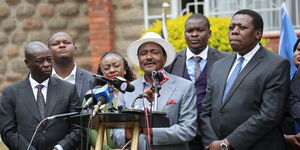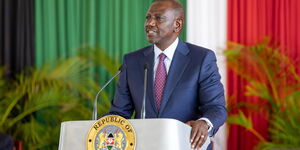Job seekers have been granted relief from expensive clearance certificates after President Uhuru Kenyatta on Monday, April 4 signed the Employment (Amendment) Bill into law.
The law stipulates that employers will only be required to ask prospective employees to present academic certificates and any other documents that are availed at zero cost.
For documents where job seekers are charged, such as those obtained from the Directorate of Criminal Investigations (DCI), the Higher Education Loans Board (HELB), Credit and Reference Bureau (CRB), employers can only ask for them once employment is guaranteed.
"The act gives job seekers by requiring employers to only ask for clearance or compliance certificates upon granting an offer of employment to a prospective employee.” Previously, prospective employees were required to avail such documentation during job application," the President noted while hailing the new law.
Other bills that were signed into law include the 2022 Supplementary I Appropriation Bill (Supplementary Budget), and Copyright (Amendment) Bill, the 2020 Kenya Deposit Insurance (Amendment) Bill and the 2022 Industrial Training (Amendment) Bill.
The Supplementary Budget will see the unlocking of Ksh139.7 billion in exchequer funds which will be used in drought-related interventions, security operations, election preparedness, fuel stabilization and settlement of pending bills.
About 40 per cent or Ksh34.4 billion of the supplementary budget will be directed towards oil subsidy, which is expected to bring to an end the current fuel crisis in the country.
"A sum of Ksh34,446,813,295 from the Supplementary Budget has been allocated to the Government fuel stabilization programme aimed at cushioning Kenyans from high-cost fuel prices occasioned by the worsening global energy crisis," reads the new law.
This comes in line with an earlier pronouncement by Petroleum and Mining Principal Secretary Andrew Kamau, who noted that the government would release money to foot a Ksh13 billion bill owed to oil marketers.
The government will allocate Ksh8.8 billion to the Independent Electoral and Boundaries Commission (IEBC) to facilitate its preparation for the August 9 General Election.
In addition, the National Police Service (NPS) will receive Ksh950 million for the recruitment of officers to boost their numbers and enable them to ensure security during the election period.
Government projects that received financial boost include the Kenya Meat Commission's livestock uptake program (Ksh1.4 billion); the State Department for Devolution for direct mitigation efforts (Ksh1.2 billion) and the Competency-Based Curriculum (CBC) which got Ksh8.1billion.
"Kshs 6.9 billion to the Teachers Service Commission (TSC) to cater for teacher remuneration, training and related expenses. The Ministry of Education was assigned Ksh2 billion in the Supplementary Budget for the construction of additional classrooms," the statement read in part.

KNEC Releases 2025 KJSEA Results, How to Check Breaking News











